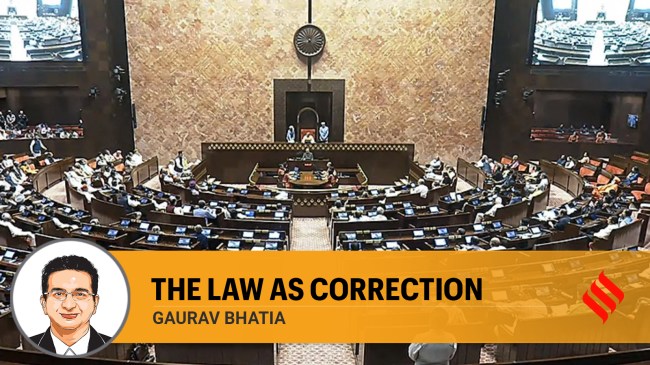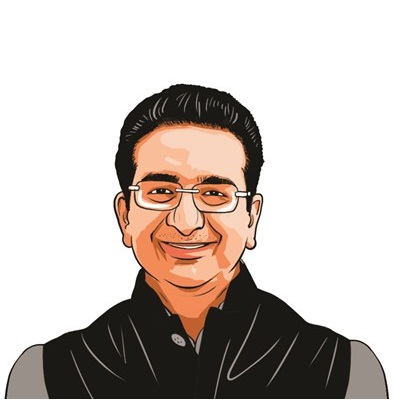Opinion Waqf Bill corrects injustice from colonial era, UPA’s 2013 amendment
It is another decisive step on the lines of the abrogation of Article 370, the criminalisation of triple talaq and the Citizenship (Amendment) Act, underscoring the philosophy of 'Modi hai to mumkin hai'
 The amendment will go a long way towards correcting the flaws of the 2013 amendment. (PTI Photo)
The amendment will go a long way towards correcting the flaws of the 2013 amendment. (PTI Photo) The Waqf (Amendment) Bill of 2024 is an idea whose time has undoubtedly come. The roots of the existing waqf law go back to the British colonial era, where it laid the groundwork for what would become a divisive legacy in India’s governance. This was a calculated strategy designed to further the British policy of divide and rule, as it played on religious lines to weaken the unity of the nation. Regrettably, post-Independence, this policy was continued by the Congress party, which perpetuated such policies even after the country gained freedom.
The time to correct this historical injustice is now, and the Waqf (Amendment) Bill seeks to address longstanding concerns and make the waqf management system more inclusive, transparent, and efficient. Correcting the historical injustice done to both Muslims and non-Muslims, it is another decisive step on the lines of the abrogation of Article 370, the criminalisation of triple talaq and the Citizenship (Amendment) Act, underscoring the philosophy of “Modi hai to mumkin hai”.
The amendment will go a long way towards correcting the flaws of the 2013 amendment. The latter, passed by Parliament after just five hours of discussion, was a blatant attempt at appeasement politics on the eve of the 2014 general election. A closer examination of the 2013 amendment would reveal that it was against the basic spirit of the Constitution as it discriminated between citizens on the basis of religion, which is non-permissible under articles 14, 15, 16, and 21. Allowing the waqfs to claim land belonging to other communities resulted in abuse and a rapid expansion in the amount of land under waqf management. It also resulted in unrestricted claims being laid on public and government land, contrary to the concept of waqfs, where only the donation of self-owned properties was allowed.
Confrontational attitude
Through this article, I wish to present an alternative view to the one expressed by Salman Khurshid (‘The march of uniformity’, IE, April 3), whom I highly respect and who is a colleague at the Bar. His article starts by stating that the Joint Parliamentary Committee (JPC) headed by MP Jagdambika Pal had set a confrontational tone. It is noteworthy that the JPC has throughout followed a righteous path and rigorous process, deliberating for over six months and processing nearly 1 crore suggestions. It has held 28 meetings and conducted 128 hours of consultation, including with the waqf boards of various states. However, the only example of a confrontational approach was the unruly behaviour of TMC leader Kalyan Banerjee, who smashed a glass bottle and threw it at the JPC chair on October 22, 2024.
The author claims the 2024 amendment fails the test of constitutionality in terms of Article 25 and Article 26, since waqfs have a religious flavour. These assertions are misleading since the superior courts have repeatedly held that waqf boards are statutory bodies and their duties are secular and not religious in nature. In Syed Fazal Pookoya Thangal vs. Union of India, the Kerala High Court has held that the Waqf Board “is a statutory body, pure and simple. It is not a representative body of the Muslim community.” Similar observations have been made by the Allahabad High Court in Hafiz Mohammad Zafar Ahmad vs UP Central Sunni Board of Waqf.
It may be further noted that Articles 25 and 26 themselves do not grant absolute rights, but are subject to “public order, morality and health”. Even if we consider Khurshid’s assertions to be true with regard to the waqf boards being religious in nature, the amendment is squarely covered under Article 25(2)(a), under which the state is allowed to make a law “regulating or restricting any economic, financial, political or other secular activity which may be associated with religious practice”.
Inclusion of non-Muslim members
The issue of the inclusion of two non-Muslim members in the waqf boards is again without any substance or merit. As has been pointed out by the home minister, the waqf boards are administrative and not religious bodies. Non-Muslims will only be included in the boards — where Muslim members will continue to be in the majority — and not the waqfs themselves. It is a contradiction that the waqfs are open to accepting donations from non-Muslims (as provided in the 2013 amendment), but are unwilling to give any representation to them in administering waqf properties. Giving due representation to other religions whose land has been taken over by the waqf boards is necessary to ensure equal protection of laws.
The article speaks about the removal of the category of waqf by user. It is noteworthy that the concept is against constitutional principles and the doctrine of natural justice as well as Islamic law. This provision has been the most abused since its inclusion in the 2013 amendment. This is clear from the fact that in the 100 years from 1913 to 2013, waqf boards managed 18 lakh acres of land, but in the 12 years since the 2013 amendment, this has grown by 21 lakh acres — an eye-opening increase and a prime example of the abuse of the Waqf Act by certain individuals with vested interests.
The abuse is apparent, as seen in, for example, the claims over an entire village in Tiruchirappalli, Tamil Nadu — where, shockingly, a 1,400 year old religion claims ownership rights over a temple built 1,500 years ago. Similar claims have been made about the Parliament building being a waqf property by AIDUF leader Badruddin Ajmal, as well as over Bet Dwarka and the Taj Mahal.
The author has struck an apologetic tone in claiming that the 123 prime properties in Delhi given to the Waqf Board by the UPA government in 2014 were in fact waqf land that had been inadvertently claimed at the time of the capital’s establishment, and that is why they were returned. The timing of the transfer, just a few days before the Model Code of Conduct came into force, was itself suspect. Further, these properties were disputed and the matters were being heard by the Delhi High Court. Gifting them to the Waqf Board illegally when the matter was subjudice was a gross encroachment of the powers of the court.
Separate boards would lead to segregation
The author has also claimed that making separate boards for the Bohras and Aga Khanis would promote segregation and separation, even as representation is sufficiently addressed by having separate Sunni and Shia boards. First, there are only two states with a separate Shia board — UP and Bihar — while Jammu and Kashmir has initiated the process to establish a Shia board. Second, it is telling that the Congress party demands a caste census for Hindus on one hand but is unwilling to grant the same for the Muslim community. Further, having separate boards would only serve to improve administration and the public trust of their respective communities.
The author’s assertions that the 2025 amendment making the Limitation Act applicable to the Waqf Act will undo the beneficial steps taken over the years is purely misleading. These are the sort of self-serving arguments that led to the denotification of the 123 prime properties in Delhi. In fact, the basis of the law of limitation is to ensure that the person defending is not burdened with preserving evidence over an onerously long time. The Congress government removing its applicability led to increased litigation, since claims could be preferred by the waqf boards even after many years had passed.
At the cost of reiteration, the amendment has no effect on the religious activities of the waqf and deals only with the secular and economic activities of the boards. It seems that while assiduously chiselling the features of the Waqf Act, the Congress party ended up defacing the statue named the Constitution of India.
The writer is a senior advocate and national spokesperson, BJP





